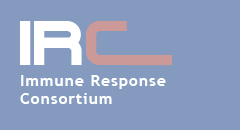







The adaptive
immune response enables humans (and other higher organisms) to combat pathogens
that they have never encountered before. In spite of many important
advances over the past decades, a predictive understanding of the principles
that govern the emergence of an adaptive immune response has been elusive.
The Immune Response Consortium (IRC) aims to take steps
toward the development of such predictive mechanistic principles.
A specific focus is the adaptive immune response to Listeria monocytogenes,
a class B pathogen.
The activation of the adaptive immune response is the result of cooperative
dynamic processes that span molecular, cellular, and tissue scale processes.
It is this hierarchically organized cooperativity with feedback that makes
it difficult to intuit underlying mechanisms from experimental observations
alone. The IRC aims to confront and overcome this challenge by an
approach that brings together methods rooted in the biological, physical,
and engineering sciences. Synergistic use is made of theoretical and
computational approaches and genetic, biochemical, and imaging experiments
to address the pertinent issues. ![]()
The IRC is a collaboration involving scientists and engineers from MIT, Stanford University, Washington University, New York University, Memorial Sloan Ketering Cancer Center, University of California (Berkeley), and Los Alamos National Laboratory. The IRC is supported by the National Institute of Allergy and Infectious Diseases.